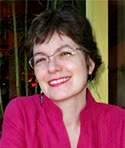Dear Blog,
You should know I am the person who takes 10 books out of the library and can only finish one of them. Is it because I am lazy? Hardly. I read fast and frequently. Is it because I get distracted? Nope. My imagination gets hunger pangs for novels. But I carry those mostly unread books back to the library because the writing is too annoying to shovel into my brain.
Every cliche, overused description, and lost opportunity to use language well distracts me. I'm reading along and think, good set-up or interesting characters, and then--yuck--the dreadful clunkers interrupt my ability to enter this crafted world. I start reading as an editor, fixing each one as I go along, and after a couple of chapters, I'm cringing or arguing with the author.
"Why didn't you THINK I'd notice you were using flabby phrases?"
If a character is speaking in cliches, and that's who they are, fine. But the author had better prove to me that they can write the rest with fresh observation.
Some writers have told me that I'm too picky. That these are teeny tweaks that nobody really cares about. I think not. It is the difference between a pretty good book and a really good one. In a great book, I'm engaged by plot, character, philosophy, conflict, and the surprising magic of good language. Take away the delights of good sentences and the story deflates.
It's like the authors forgot to do the final rewrite. Shame on them. Read some poetry if you want to see what it looks like when every word is well chosen.
Best Wishes,
Cranky Reader.
Thursday, May 7, 2009
Subscribe to:
Post Comments (Atom)







2 comments:
I'm with you! I've put down many a novel because the prose was just not good enough. Sometimes I think, This would make a good movie -- because the plot is there -- but it just isn't working as a book!
I still remember reading Tom Robbins’ description of a room so dark that there wasn’t even “a cufflink of moonlight” on the floor. The delight of detail done with imagination.
Post a Comment